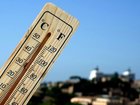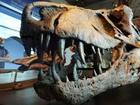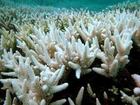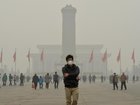Europe is headed for scorching summers with temperatures well over 40 degrees Celsius (104 deg Fahrenheit) and droughts in the south within the next 40 years, climate scientists said Friday.
Europe is expected to witness some of the most dramatic climatic changes due to global warming, according to research published in the journal Environmental Research Letters.
 Full Story
Full Story
Graphic on debris and defunct space hardware that currently orbit the earth
Australian scientists said Friday they aim to prevent a real-life version of the space disaster scenario portrayed in Oscar-winning film "Gravity" by removing extraterrestrial debris with lasers.
 Full Story
Full Story
A new dinosaur species discovered in Portugal dominated the food chain 150 million years ago -- the Tyrannosaurus Rex of its time, researchers said Wednesday.
The new species is the largest land predator discovered in Europe and one of the largest worldwide of the Jurassic era, said authors Christophe Hendrickx and Octavio Mateus of the Universidade Nova de Lisboa and Museu da Lourinha.
 Full Story
Full Story
Time is running out for Australia's iconic Great Barrier Reef, with climate change set to wreck irreversible damage by 2030 unless immediate action is taken, marine scientists said Thursday.
In a report prepared for this month's Earth Hour global climate change campaign, University of Queensland reef researcher Ove Hoegh-Guldberg said the world heritage site was at a turning point.
 Full Story
Full Story
Officials in the Marshall Islands blamed climate change Wednesday for severe flooding in the Pacific nation's capital Majuro which has left 1,000 people homeless.
The Marshalls declared a state of emergency in the wake of the flooding, which peaked Monday when surges caused by so-called "king tides" inundated areas of the low-lying capital.
 Full Story
Full Story
Prime Minister Tony Abbott was accused Wednesday of mounting "a massive assault on the environment" after he warned too much Australian forestry was closed to logging and there were enough national parks.
In an address to a timber industry dinner, the centre-right leader said he would establish a new advisory council for the industry, calling it a sector that had been "frowned upon" for too long.
 Full Story
Full Story
Chinese Premier Li Keqiang on Wednesday said he is "declaring war" on pollution, describing it as a "red-light warning" against inefficiency as he sought to address public concerns on issues from acrid smog to food safety.
China's three decades of rapid industrialization and urbanization have transformed its economy, and seen incomes soar.
 Full Story
Full Story
They may look like guts stuffed in cellophane, but five fish hauled up from near-record depths off the coast of New Zealand are providing scientists with new insights into how deep fish can survive.
In a paper published this week in the Proceedings of the National Academy of Sciences, scientists from the U.S., Britain and New Zealand describe catching translucent hadal snailfish at a depth of 7 kilometers (4.3 miles).
 Full Story
Full Story
Snails, one of France's signature dishes, could be off the menu if the country fails to stem an invasion by a slimy worm from Southeast Asia, scientists warned on Tuesday.
The warning is being sounded over a voracious species called the New Guinea flatworm.
 Full Story
Full Story
French scientists said Monday they had revived a giant but harmless virus that had been locked in the Siberian permafrost for more than 30,000 years.
Wakening the long-dormant virus serves as a warning that unknown pathogens entombed in frozen soil may be roused by global warming, they said.
 Full Story
Full Story



